How to calculate the difference between dates on Google Sheets
If you are tasked with working with a spreadsheet containing a large number of dates, calculating the difference between multiple dates can be very frustrating. While the easiest option is to rely on an online date calculator, it may not be the most convenient as you may have to enter the dates one by one into the online tool and then manually copy the results into a spreadsheet.
For large numbers of dates, you need a tool that gets the job done more conveniently. Fortunately, Google Sheets allows users to locally calculate the difference between two dates in a spreadsheet. In this article, we will help you calculate the number of days between two dates on Google Sheets using some built-in functions.
How to calculate the difference between dates on Google Sheets
If you want Google Sheets to calculate all the days between two different dates in the calendar, including working days and holidays, then you can Use the following two functions to accomplish it.
Method #1: Use the DAYS function
DAYS is a function in Google Sheets that determines the difference between two dates and returns the difference in days. The function will include all days between two dates and will automatically take into account leap days in the year. The DAYS function on Google Sheets looks like this: DAYS(end_date,start_date).
To calculate the difference using the DAYS function, launch Google Sheets on your web browser and open the spreadsheet you want to work on. In the worksheet, click a blank cell and type =DAYS("06/01/2022", "01/01/2022")if you want to find June 1, 2022 and the year 2022 The number of days between January 1st. You can replace the date with your own format: MM/DD/ YYYY if you use the US format; or ## if you live in #In the UK, is DD/MM/YYYY.
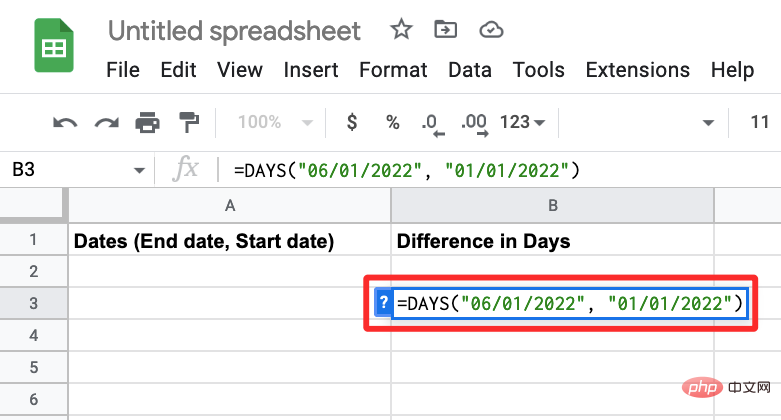
Enter key on your keyboard, this function will display the number of days between the two dates you enter.
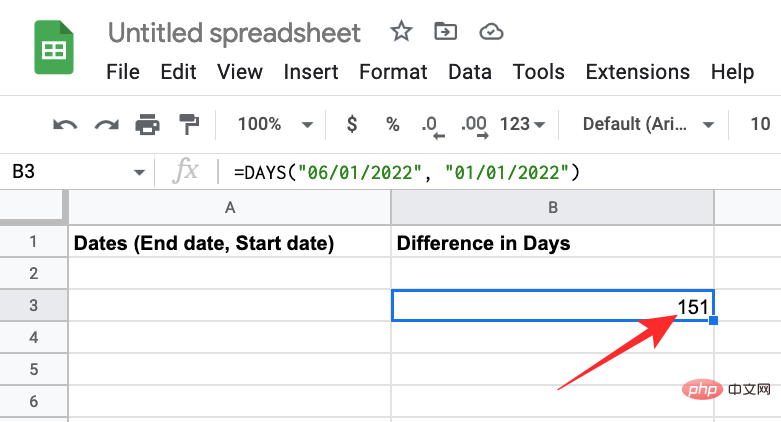
D and the end date in column E.
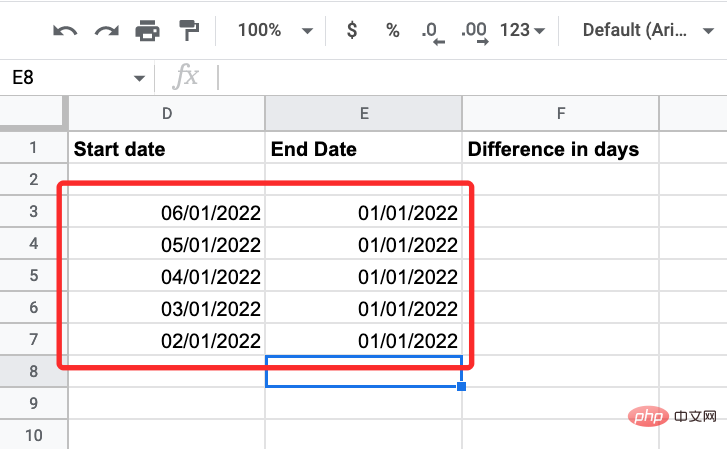
F3.
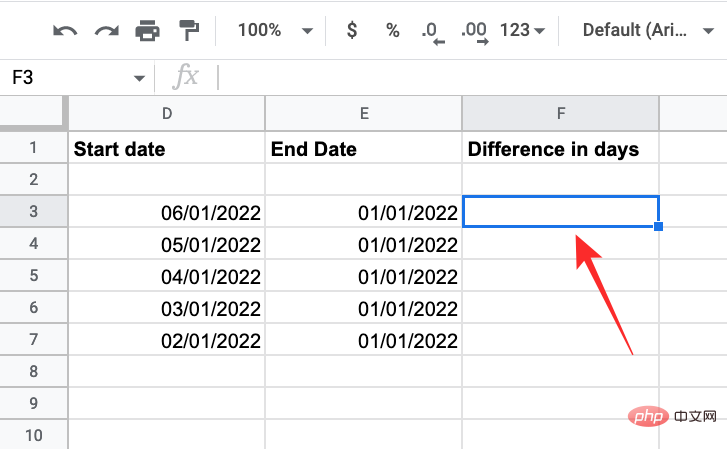
“=DAYS(D3,E3)” and press the Enter key on your keyboard .
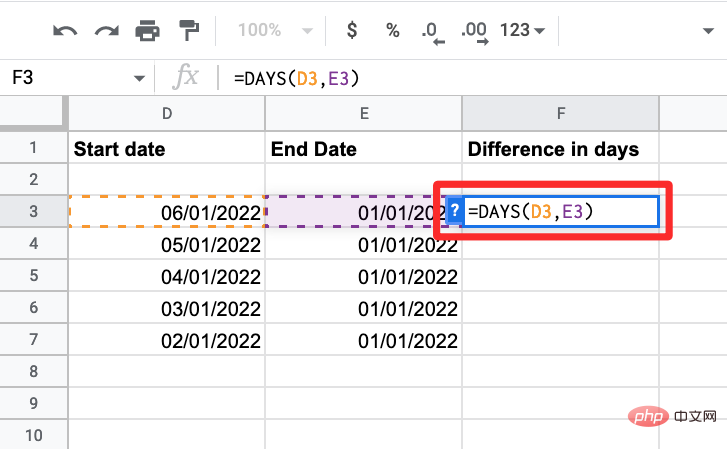
After pressing Enter, the spreadsheet will display the output, which are the two listed in cells D3 and E3 difference between dates. In addition to the difference between the two dates, the table will also preview the difference between the dates you enter in other cells in columns D and E. These suggestions will be marked in light green.
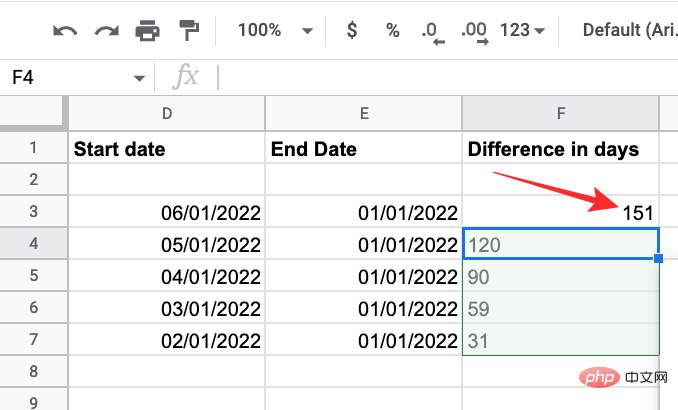
checkmark in the Suggested Autocomplete box.
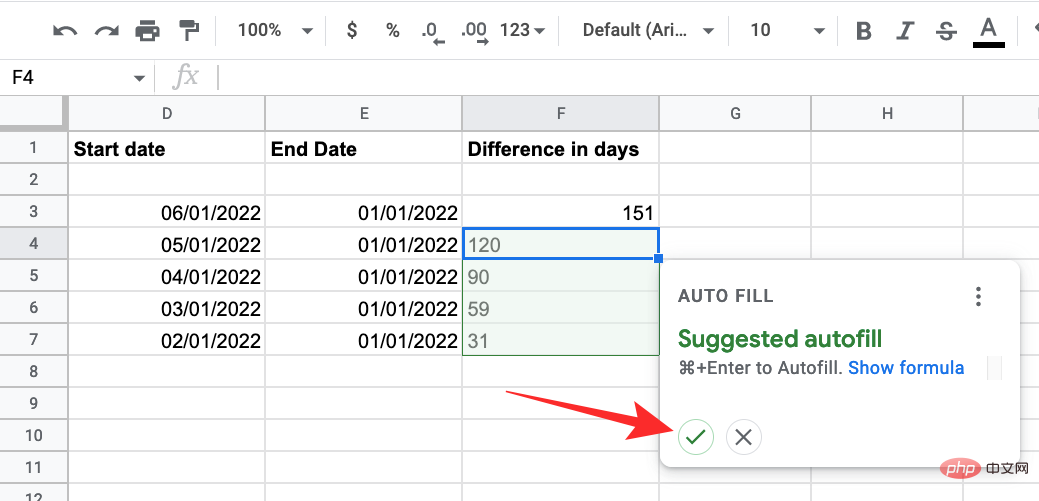
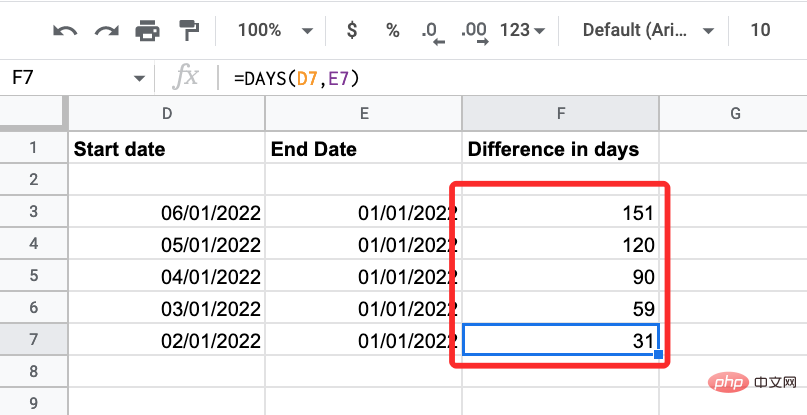
=DATEDIF(start_date, end_date, unit). As you can see from this syntax, the output of the function can have different units if you specify it. These units include:
- D: The total number of days between two dates
- M : The number of months between two dates, expressed as an integer.
- Y : The number of whole years between two dates.
- MD: This is the number of days between two dates minus the whole month.
- YM: This is the number of months between two dates minus the full year.
- YD: This is the number of days between two dates, if they are one year apart.
Once you understand how this feature works, you can start using it in Google Sheets. To do this, open a spreadsheet in Sheets and enter the start and end dates in two different cells. As you can see from the example below, we entered the start and end dates of the Genesis spacecraft mission in cells B3 and B4.
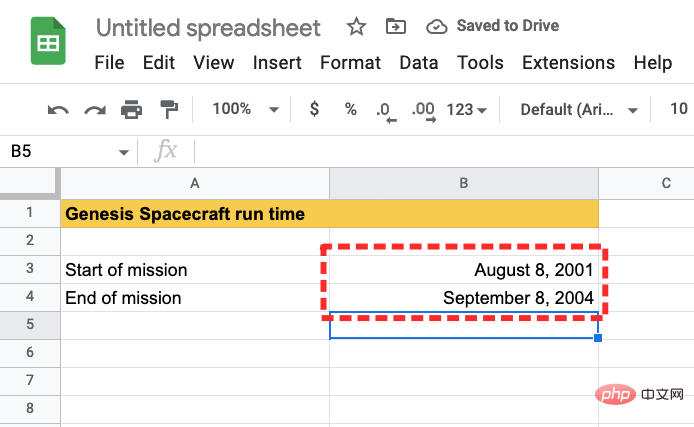
#You can now calculate the difference between two dates using the six different units we explained above. So we created another table under "Task Duration" to calculate the difference in all these units listed in cells B7 – B12.
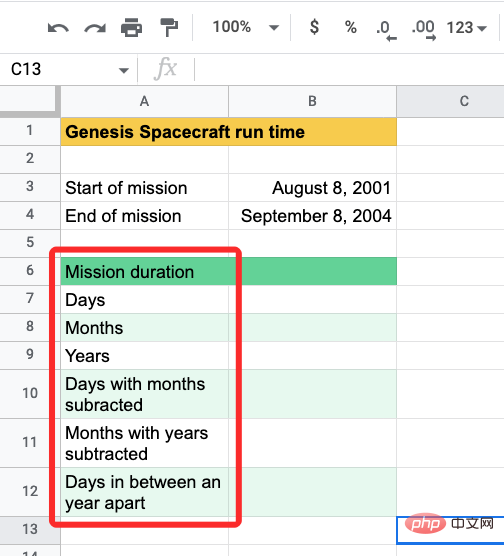
To calculate the difference in days, select cell B7 and enter " =DATEDIF(B3, B4,"D") ". We enter "D" as the unit to calculate the difference in days. To get results in other units, type any unit within quotation marks.
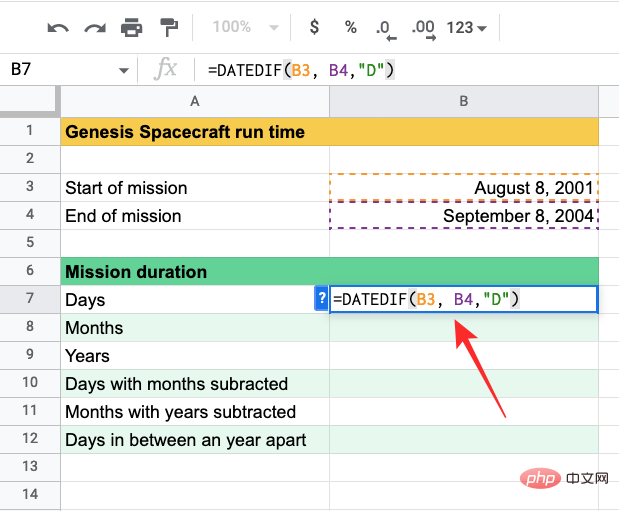
After entering, press Enter, you will see the task duration (in days) is 1127 days .
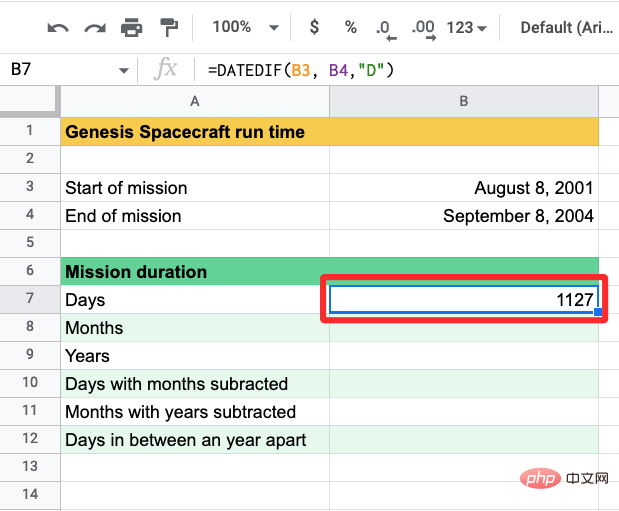
You can get the difference in months by replacing "D" with "M" as the relevant unit. You can type the required syntax in cell B8 to see the number of months the Genesis task ran.
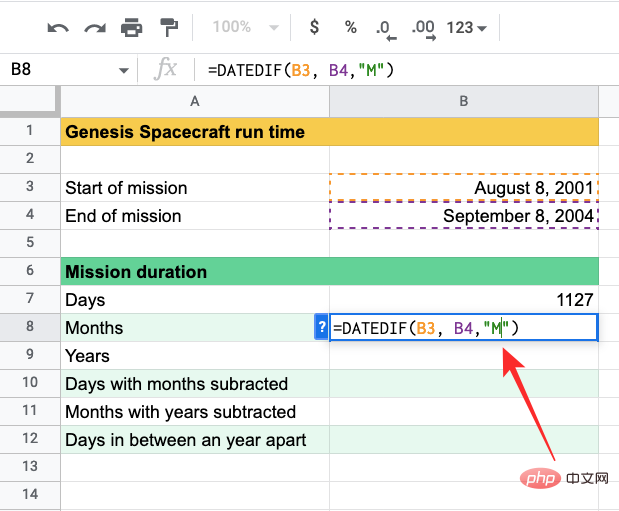
#Sheets will now tell you that the mission lasted a total of 37 months.
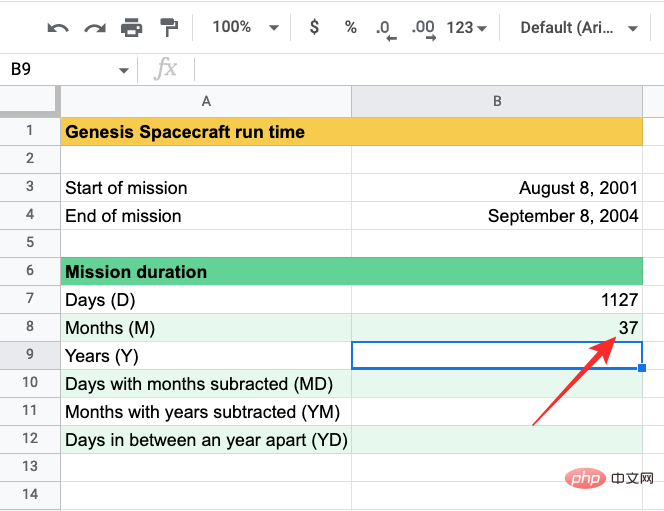
Similarly, this function will produce the following results in other cells. We have mentioned the units we are using for each cell from B7 to B12 which are located in adjacent rows under column A [("brackets" under the "Task Duration" section )Inside].
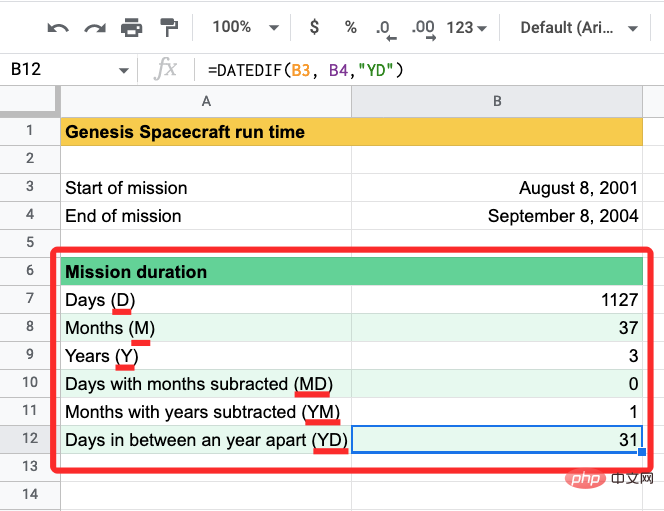
If you don't want to use cell references when playing with the DATEDIF function, you can do this by typing " =DATEDIF("8/8/2001","9/ 8/2004","D directly calculates the difference between two dates")"Get the result within a few days. You can replace the date with your own date and the unit in which it is calculated.
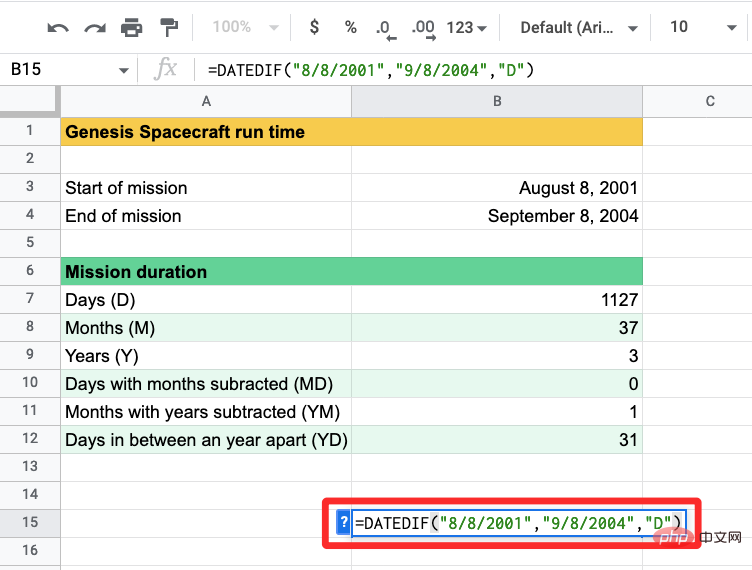
The result you see in cell B15 is the same value as in B7 where we entered the cell Dates in box references (B3 and B4).
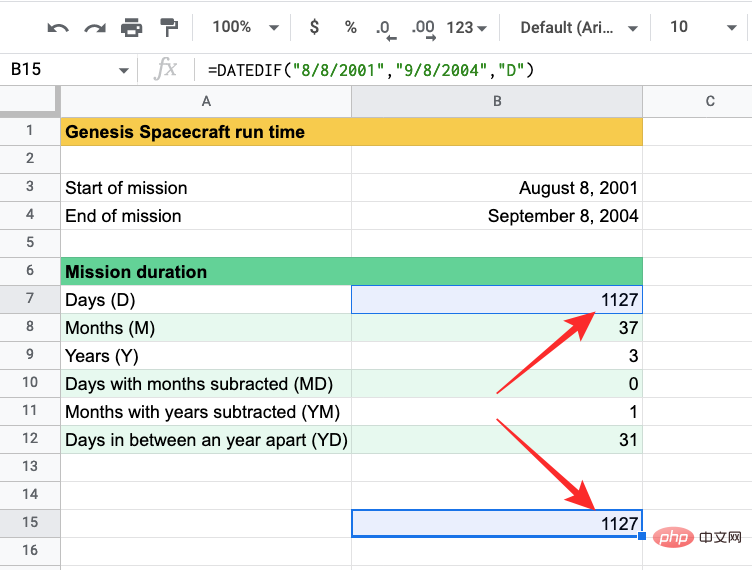
How to calculate the number of working days between two dates
In addition to calculating the total number of days between two dates, Google Sheets also provides a Function that allows you to calculate all working days between two different dates. This can be helpful when keeping an eye on the number of available days or workdays in a given month and keeping tabs on employee pay and time off.
To do this, we use the NETWORKDAYS function that only calculates weekdays, omitting weekends (Saturday and Sunday) in the process. Similar to DATEDIF, NETWORKDAYS requires you to enter the story date first and then the end date to get a valid answer.
The syntax of the NETWORKDAYS function is as follows - =NETWORKDAYS(“start date”, “end date”). The answer will be in days because we are counting the number of working days between two dates and it doesn't make sense to count them in years or months.
Now that you understand how this feature works, you can start using it in Google Sheets. To do this, open a spreadsheet in Sheets and enter the start and end dates in two different cells. As you can see in the example below, we have created a spreadsheet to calculate the number of working days for the entire month, as can be seen from the start and end dates listed under columns A and B.
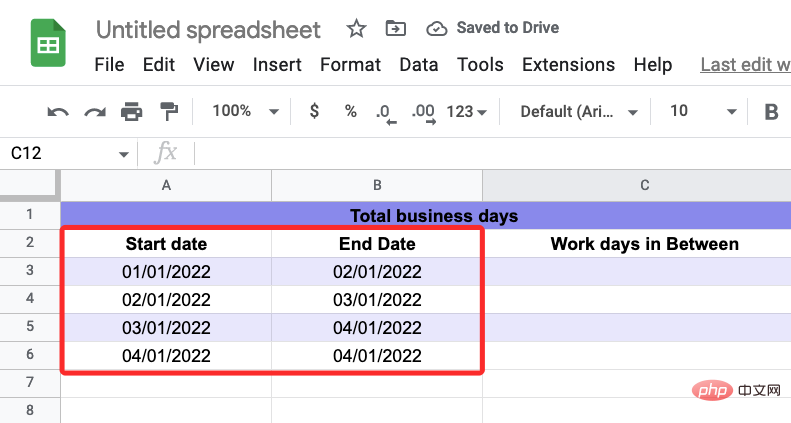
To calculate the number of working days between given dates starting on row 3, click cell C3.
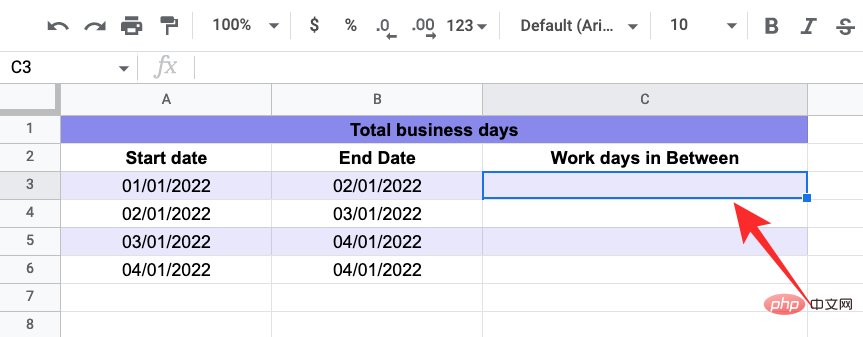
In this cell, type "=NETWORKDAYS(A3,B3)". You can replace this data with your own cell reference.
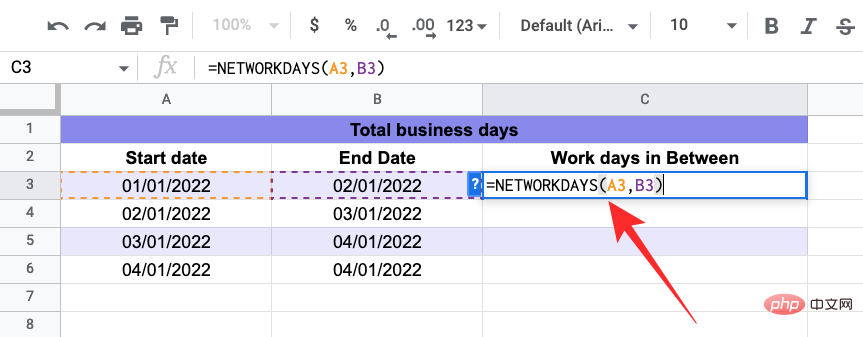
After pressing the Enter key, the table will display the number of working days between the above dates.
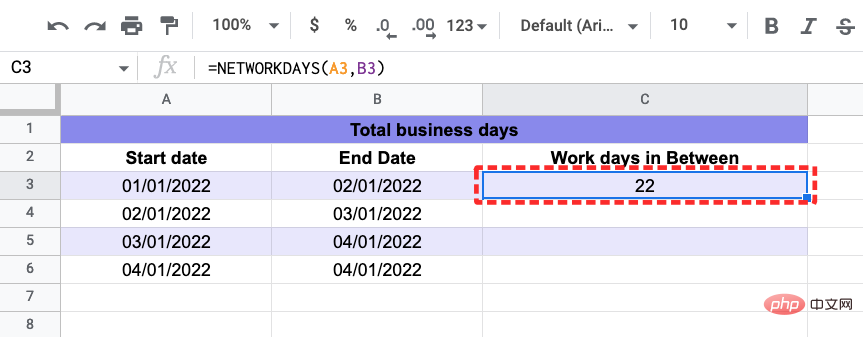
#You may or may not see Autofill suggestions for other dates you enter in the worksheet. To use the same feature to find weekdays between other dates, click the blue square dot in the lower right corner of cell C3 and drag it down.
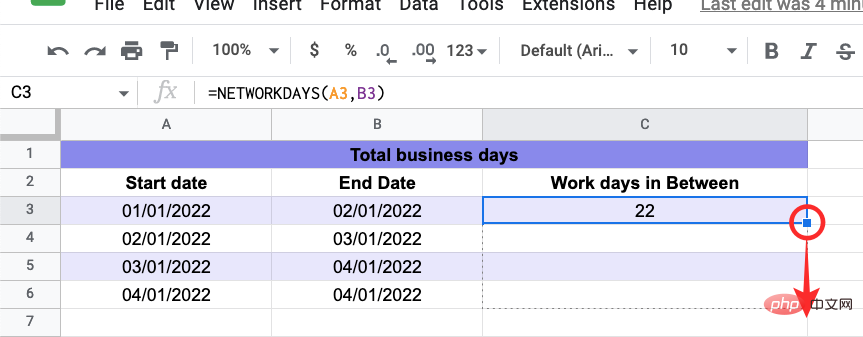
#When you do this, the cells under column C will display the working days between the two dates in their respective rows.
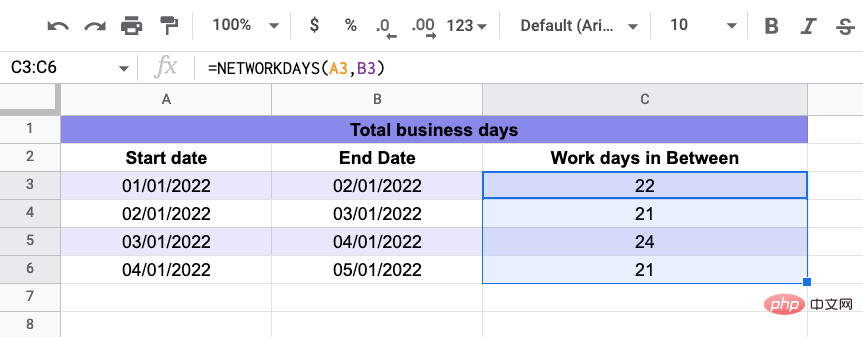
If you don’t want to use cell references, but want to calculate the working days between two dates by entering them manually, you can enter " =NETWORKDAYS("01 /01/2022","02/01/2022") ". You can replace these dates with your own to get the desired results.
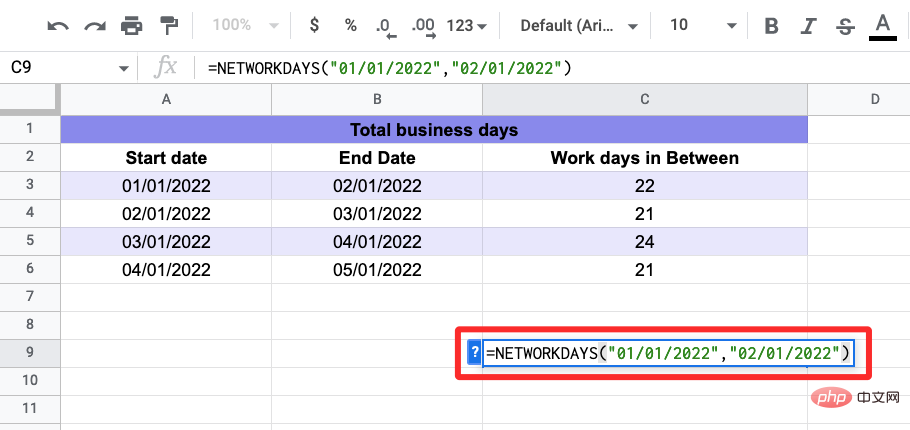
When you press Enter after entering the above function, you should see the difference in the number of days without counting Saturday and Sunday . As you can see from the example below, the difference in cell C9 is the same as the difference in cell C3.
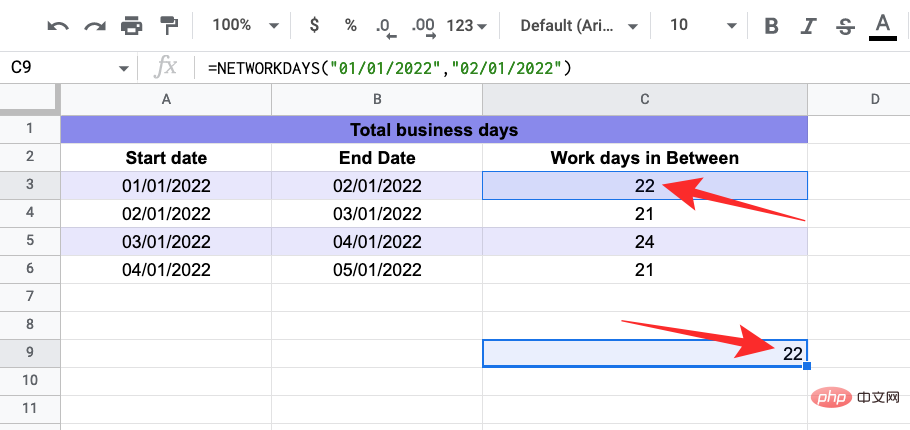
How to Calculate the Number of Days Since Your Birthday
If you want to know how long you have been alive on this planet and how long you have until today To celebrate birthday again, you can use two functions - DATEDIF and TODAY. First, create a worksheet that contains your date of birth and a cell dedicated to displaying the current date, leaving the latter blank until later. For example, we entered the date of birth in cell A2.
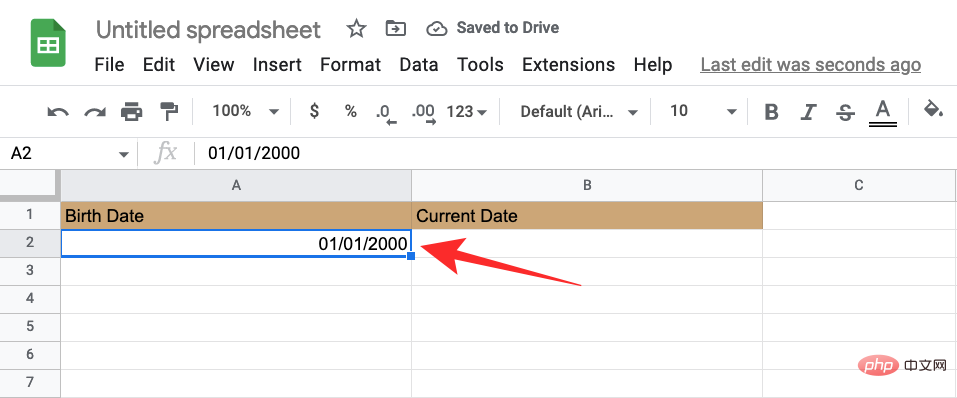
In cell B2, type " =today()", which is a method to enter the current date into the work Table functions.
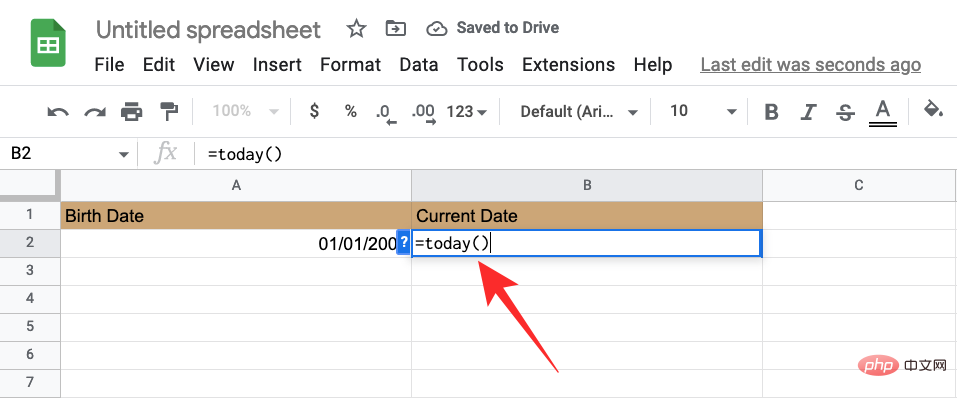
When you press Enter after entering the above text, the current date should appear in cell B2.
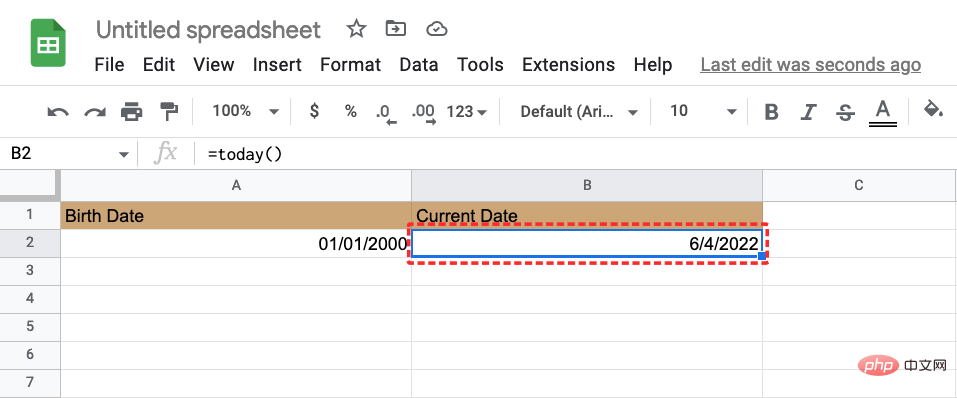
#We have now created another table to calculate different types of data between your birthday and the current date. As you can see in the example below, you can calculate the number of days, months, and years since the date you were born, as well as the number of days between your last birthday and your next birthday. To calculate these numbers, we will use the DATEDIF function from Method #2 above.
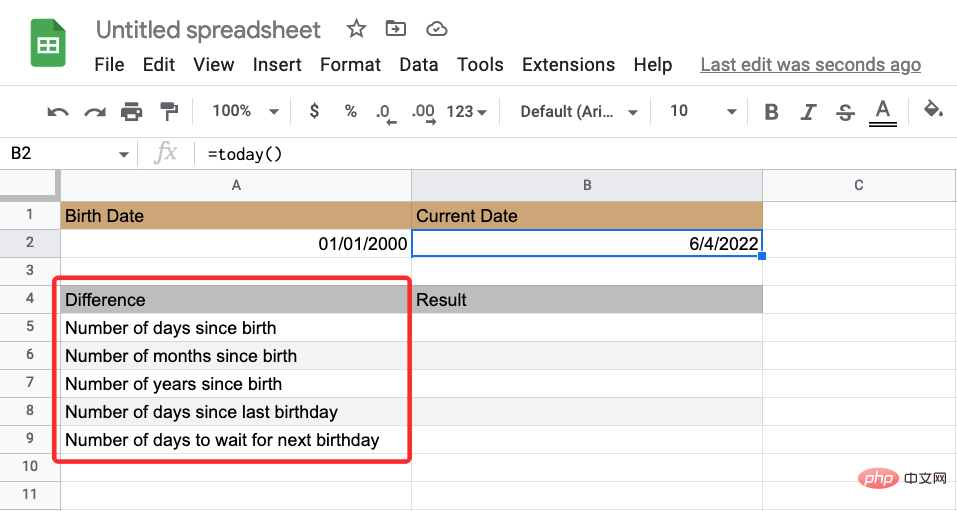
If you want to create a similar table with other dates, you can use these codes to get the required values.
- Days after birth:=DATEDIF(A2,B2,”D”)
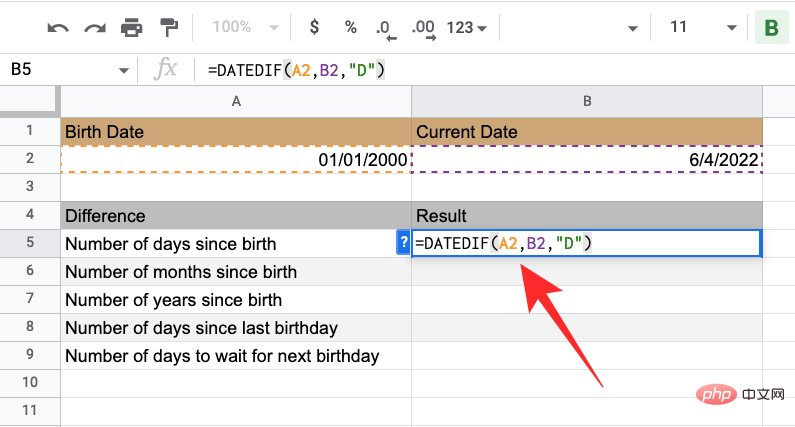
- ##Months after birth:=DATEDIF(A2,B2,”M”)
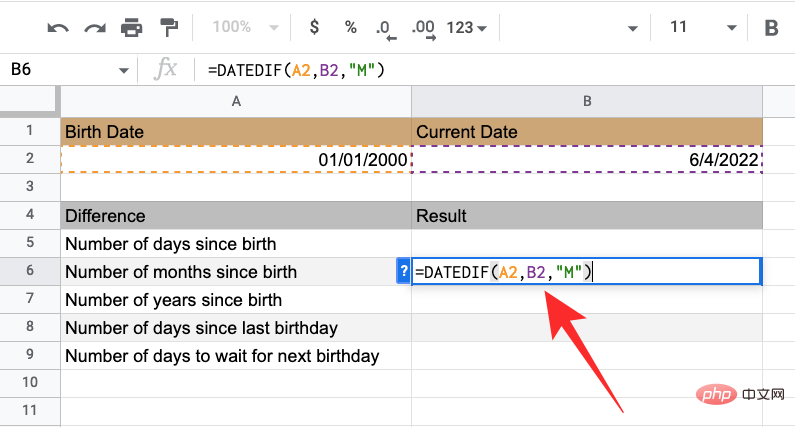
- ##After birth Number of years
- :=DATEDIF(A2,B2,”Y”)
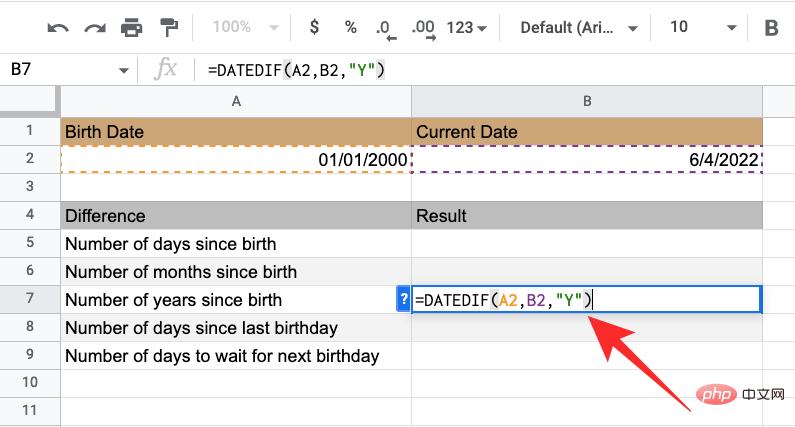
- Number of days since last birthday
- :=DATEDIF(A2,B2,”YD”)
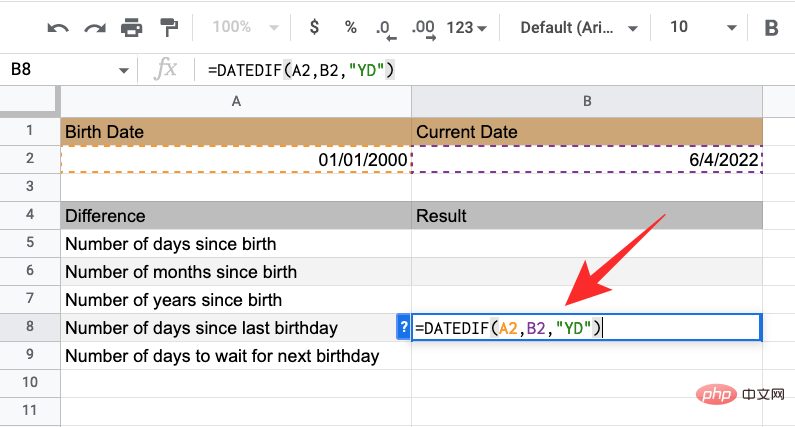
- :=365- B8
#Depending on the spreadsheet you create, you may need to change the cell ranges accordingly. The final result will look like this: 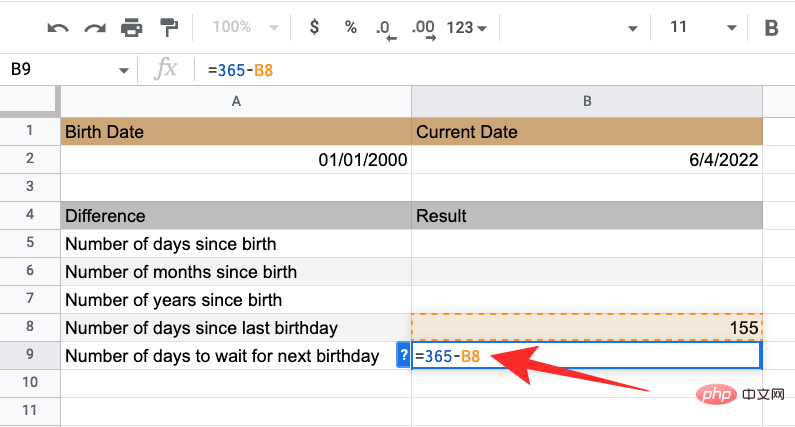
#You can view this spreadsheet later to get updated values based on the current day. 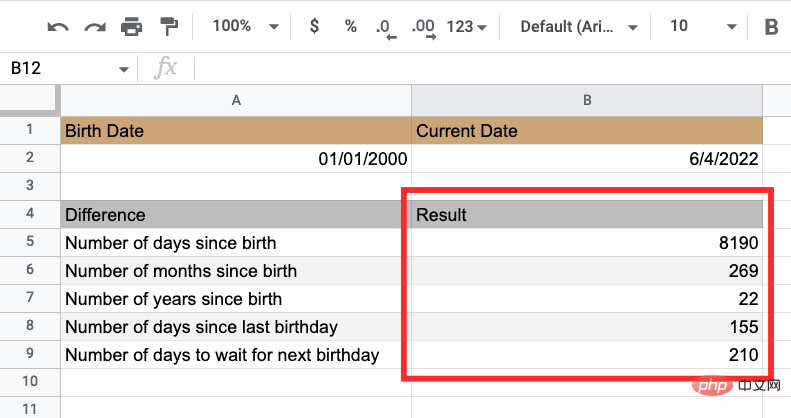
The above is the detailed content of How to calculate the difference between dates on Google Sheets. For more information, please follow other related articles on the PHP Chinese website!

Hot AI Tools

Undresser.AI Undress
AI-powered app for creating realistic nude photos

AI Clothes Remover
Online AI tool for removing clothes from photos.

Undress AI Tool
Undress images for free

Clothoff.io
AI clothes remover

AI Hentai Generator
Generate AI Hentai for free.

Hot Article

Hot Tools

Notepad++7.3.1
Easy-to-use and free code editor

SublimeText3 Chinese version
Chinese version, very easy to use

Zend Studio 13.0.1
Powerful PHP integrated development environment

Dreamweaver CS6
Visual web development tools

SublimeText3 Mac version
God-level code editing software (SublimeText3)

Hot Topics
 How to fix formula parsing errors in Google Sheets
May 05, 2023 am 11:52 AM
How to fix formula parsing errors in Google Sheets
May 05, 2023 am 11:52 AM
What are formula parsing errors in Google Sheets? Formula parsing errors occur in Google Sheets when the application cannot handle the instructions in the formula. This is usually because there's a problem with the formula itself, or there's a problem with the cells the formula refers to. There are many different types of formula parsing errors in Google Sheets. The method for fixing formula parsing errors in Google Sheets depends on the type of error your formula produces. We'll look at some of the most common formula parsing errors below and how to fix them. How to fix #ERROR! Error in Google Sheets #Error! Formula parsing errors occur when Google Sheets doesn't understand your formula but isn't sure what the problem is. When you are on the spreadsheet
 Excel found a problem with one or more formula references: How to fix it
Apr 17, 2023 pm 06:58 PM
Excel found a problem with one or more formula references: How to fix it
Apr 17, 2023 pm 06:58 PM
Use an Error Checking Tool One of the quickest ways to find errors with your Excel spreadsheet is to use an error checking tool. If the tool finds any errors, you can correct them and try saving the file again. However, the tool may not find all types of errors. If the error checking tool doesn't find any errors or fixing them doesn't solve the problem, then you need to try one of the other fixes below. To use the error checking tool in Excel: select the Formulas tab. Click the Error Checking tool. When an error is found, information about the cause of the error will appear in the tool. If it's not needed, fix the error or delete the formula causing the problem. In the Error Checking Tool, click Next to view the next error and repeat the process. When not
 How to set the print area in Google Sheets?
May 08, 2023 pm 01:28 PM
How to set the print area in Google Sheets?
May 08, 2023 pm 01:28 PM
How to Set GoogleSheets Print Area in Print Preview Google Sheets allows you to print spreadsheets with three different print areas. You can choose to print the entire spreadsheet, including each individual worksheet you create. Alternatively, you can choose to print a single worksheet. Finally, you can only print a portion of the cells you select. This is the smallest print area you can create since you could theoretically select individual cells for printing. The easiest way to set it up is to use the built-in Google Sheets print preview menu. You can view this content using Google Sheets in a web browser on your PC, Mac, or Chromebook. To set up Google
 How to solve out of memory problem in Microsoft Excel?
Apr 22, 2023 am 10:04 AM
How to solve out of memory problem in Microsoft Excel?
Apr 22, 2023 am 10:04 AM
Microsoft Excel is a popular program used for creating worksheets, data entry operations, creating graphs and charts, etc. It helps users organize their data and perform analysis on this data. As can be seen, all versions of the Excel application have memory issues. Many users have reported seeing the error message "Insufficient memory to run Microsoft Excel. Please close other applications and try again." when trying to open Excel on their Windows PC. Once this error is displayed, users will not be able to use MSExcel as the spreadsheet will not open. Some users reported problems opening Excel downloaded from any email client
 5 Tips to Fix Stdole32.tlb Excel Error in Windows 11
May 09, 2023 pm 01:37 PM
5 Tips to Fix Stdole32.tlb Excel Error in Windows 11
May 09, 2023 pm 01:37 PM
When you start Microsoft Word or Microsoft Excel, Windows very tediously tries to set up Office 365. At the end of the process, you may receive a Stdole32.tlbExcel error. Since there are many bugs in the Microsoft Office suite, launching any of its products can sometimes be a nightmare. Microsoft Office is a software that is used regularly. Microsoft Office has been available to consumers since 1990. Starting from Office 1.0 version and developing to Office 365, this
 How to embed a PDF document in an Excel worksheet
May 28, 2023 am 09:17 AM
How to embed a PDF document in an Excel worksheet
May 28, 2023 am 09:17 AM
It is usually necessary to insert PDF documents into Excel worksheets. Just like a company's project list, we can instantly append text and character data to Excel cells. But what if you want to attach the solution design for a specific project to its corresponding data row? Well, people often stop and think. Sometimes thinking doesn't work either because the solution isn't simple. Dig deeper into this article to learn how to easily insert multiple PDF documents into an Excel worksheet, along with very specific rows of data. Example Scenario In the example shown in this article, we have a column called ProductCategory that lists a project name in each cell. Another column ProductSpeci
 How to display the Developer tab in Microsoft Excel
Apr 14, 2023 pm 02:10 PM
How to display the Developer tab in Microsoft Excel
Apr 14, 2023 pm 02:10 PM
If you need to record or run macros, insert Visual Basic forms or ActiveX controls, or import/export XML files in MS Excel, you need the Developer tab in Excel for easy access. However, this developer tab does not appear by default, but you can add it to the ribbon by enabling it in Excel options. If you are working with macros and VBA and want to easily access them from the Ribbon, continue reading this article. Steps to enable Developer tab in Excel 1. Launch MS Excel application. Right-click anywhere on one of the top ribbon tabs and when
 How to remove commas from numeric and text values in Excel
Apr 17, 2023 pm 09:01 PM
How to remove commas from numeric and text values in Excel
Apr 17, 2023 pm 09:01 PM
On numeric values, on text strings, using commas in the wrong places can really get annoying, even for the biggest Excel geeks. You may even know how to get rid of commas, but the method you know may be time-consuming for you. Well, no matter what your problem is, if it is related to a comma in the wrong place in your Excel worksheet, we can tell you one thing, all your problems will be solved today, right here! Dig deeper into this article to learn how to easily remove commas from numbers and text values in the simplest steps possible. Hope you enjoy reading. Oh, and don’t forget to tell us which method catches your eye the most! Section 1: How to Remove Commas from Numerical Values When a numerical value contains a comma, there are two possible situations:





